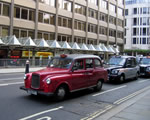 Go to main content
Go to main content
Archive Website of the UK government
Please note that this website has a UK government accesskeys system.
Main menu
Page menu
Disabled people

Travelling by taxi in a wheelchair or with assistance dogs

Licensed taxis are only required to be wheelchair accessible in some cities – but not all. However, all taxis and private hire vehicles have a duty to carry assistance dogs. Find out what these duties are and how to report any problems.
Taxis and wheelchair access
Taxis have a taxi sign on the roof and a numbered plate on the back showing that they are licensed to carry passengers. They can be hailed on the street, picked up at ranks or pre-booked. Minicabs must always be booked in advance.
In some cities (mainly larger ones), licensed taxis have to be wheelchair accessible. To find out if there are accessible taxis near you, contact the taxi licensing office at your local council.
London taxis
In London, all ‘black cabs’ are accessible for wheelchairs. Some of the newer ‘black cabs’ are fitted with an induction loop and an intercom for people using hearing aids.
See 'Taxi and private hire services' to find out how to find a licensed taxi .
Travelling by taxi while in your wheelchair
If you’re travelling in a taxi, you must make sure your wheelchair brakes are on. You should not travel sideways or at an angle while in your wheelchair as you will not be safe if the taxi brakes sharply.
If you have a powered wheelchair, you must make sure the power unit is switched off and that it’s not in freewheel mode.
See the following link to learn more about travelling safely by taxi.
Taxis and minicabs – taking your assistance dog with you
The drivers of both taxis and minicabs are under a duty to carry any guide, hearing or certain other assistance dogs in their vehicles. They are not allowed to charge extra for this and it is an offence to do so. If the driver does charge you extra, they could be fined up to £1,000. See the section 'What if a taxi or minicab won't take my dog?' to learn more about what you can do if a driver refuses to carry your assistance dog.
Types of assistance dogs you can take with you
The following types of dog can be taken with you in taxis or minicabs:
- guide dogs: those trained by the organisation Guide Dogs
- hearing dogs: those trained by Hearing Dogs
- other assistance dogs: those trained by the Dogs for the Disabled, Support Dogs or Canine Partners to assist other disabled people
Taxi and private hire vehicle drivers have been told how to identify these animals. This is why guide dogs should wear a harness and other assistance dogs a jacket with the name of the charity that trained them. If an identification card was issued for the dog, this should also be carried.
Dogs should remain on the floor and under control at all times. If your dog causes any damage to the vehicle, the driver could ask you to pay for it.
You can find out more about organisations that train assistance dogs from the following link.
What if a taxi or minicab won't take my dog?
A driver who refuses to carry your assistance dog and does not have an exemption certificate is guilty of an offence. They could be fined up to £1,000. This also applies if a minicab refuses a booking requested by someone on your behalf, or by someone who wishes to travel with you.
Who is exempt?
A driver can get an exemption certificate if they have a medical condition that is made worse by contact with dogs, such as severe asthma. Having an exemption certificate means that they don’t have to carry your dog. Exemption certificates are issued by the licencing authority.
A driver who has been given an exemption will display a yellow ‘Notice of Exemption’ notice on the windscreen of their vehicle. The front of the notice will have the letters ‘ED’ (Exemption Dogs) and will show the driver’s licence number.
Further advice is available on the 'Your rights' page.
Information about disability awareness training
A number of organisations offer awareness training tailored for taxi and private hire drivers. A good starting point is the Disabled Persons Transport Advisory Committee. They have published a report called 'Making private hire services more accessible to disabled people - a good practice guide'. It contains information on how to set up a training scheme, examples of best practice and details of some training providers.
Read more about disability awareness training good practice.
Reporting problems
You should report any problem or refusal to carry your dog. You can report such problems to the local licensing authority, local council, unitary authority or The Public Carriage Office in London.
The ‘right of access’ all disabled people have to goods, services and facilities has now been extended to transport services. As well as the duty to carry assistance dogs, taxi and minicab drivers must also ensure that they do not discriminate against you. They must not treat you less favourably or fail to make a reasonable adjustment to their service.
More information is available from the Buses and Taxis Divison, Department for Transport website.
 Facebook
Facebook Twitter
Twitter StumbleUpon
StumbleUpon Delicious
Delicious Reddit
Reddit